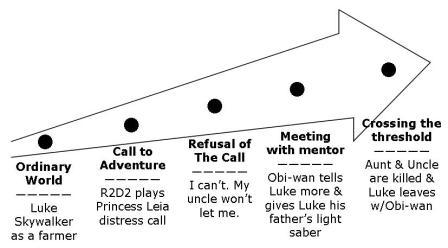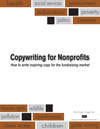Why do people respond to a great story? There are many reasons. One reason is because deep down we all want to be a hero.
Your charity gives donors a chance to be a hero. You help satisfy the psychological basis of their life . . . the desire and need to be a hero in some way, shape or form.
This naturally strong connection to true heroes is also why great stories, movies, plays, and literature are so popular for many generations. The classic story line of every epic story uses the “Hero’s Journey” format.
Homer’s story of Ulysses follows this plot. Many of Shakespeare’s plays are also based on the hero’s journey. Take a look at Aesop’s Fables and other fairy tales. And don’t forget superhero cartoons including Superman, Captain Marvel, The Incredibles and many, many more.
Hollywood movie makers love this story line. The diagram below illustrates how it was used in Star Wars IV (the first movie of the saga).
I’m not saying your appeal letters and emails must follow the hero’s journey story line. Most of the time it won’t fit and there are several other story lines to choose from.
I am saying that your charity gives donors a chance to be a hero. To be the Luke Skywalker of your mission. Because giving you donations allows them to accomplish what they never could on their own.
And you’re like their mentor in the epic Hero’s Journey (see the diagram). This is because your expertise and skills are needed – along with the donor’s funding – to make the world a better and safer place for all.
This illustrates why your ability to tell a great story results in higher response to fundraising appeals regardless of what story line you follow. The donor inserts themselves into the picture and sees how they can help . . . how they can make a difference . . . how they can be a hero for the person in need within your fundraising appeal story.
Give donors a chance to be a hero for your charity. Tell compelling, inspirational stories. Master the art of storytelling.


{ 5 trackbacks }
{ 4 comments… read them below or add one }
I like your use of graphics to illustrate your idea. I actually wrote to the producers of Star Wars in the early 1990s before the second series of films were made, with the request that they add a trailer to the movie with the message “Luke Skywalker had a mentor. Why not help other kids have mentors, too.”
No one responded and no evidence that they even heard the message. However, without the media weaving regular messages into their entertainment we won’t have consistent story-telling that gets the attention of potential volunteers and donors and turns them into shoppers who use web based directories to find places where they can help kids have mentors and extra learning.
Take a look at how I use maps and graphics to tell this story in my own articles at http://tutormentor.blogspot.com
I think the challenge for many non profits is not having people who can write and tell the stories of what they do. To me one solution is recruiting third-party groups, like high school and college journalism or writing classes. Students could be the story tellers for tutor/mentor programs all over the country if someone inspired them to take this role.
Hi Dan,
Thanks for the compliment. I’ve been on vacation which is why it took me so long to respond. By the way, Happy New Year.
Regarding your idea to use high school and college students to help nonprofits with storytelling . . . It MIGHT be an option for some of the small charities who can’t afford to hire professionals. However, generally they need help with the entire appeal and not just storytelling. And since there are many nuances of writing effective fundraising letters, I’m doubtful using a good story writer will solve their true need. This style of writing isn’t typically taught in a journalism or writing class. Still, there may be a few instances where writing just a story – and not the fundraising appeal – might work.
Hi Karen,
Thanks for this post. Would you give an example of how you used this storyline for a nonprofit?
Thanks.
Jen
Jen,
To answer your question … I haven’t used the hero’s journey in an appeal.
As I mentioned in the post, it will be hard to make this specific story line fit for a fundraising appeal.
The point I wanted readers to focus on is that any appeal gives donors the chance to be the hero. They get to help save the world and do great deeds in cooperation with your nonprofit. Donors get to achieve wonderful things they could never do on their own. They get to “save the day” … “come to the rescue” … they get to be a hero, figuratively speaking.
And it’s easier for them to see how they can help – be the hero – when you tell a great story. When you show examples of how they can make a difference through stories.
Here’s another post on nonprofit storytelling that may help you: Nonprofit Storytelling, Chapter 2